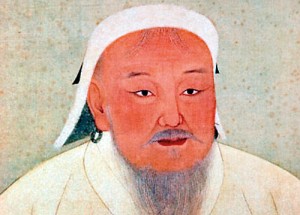Sunday Times 2
The 11 fathers of Asia
More than 800 million men living today are descended from just eleven men, including the ruthless Mongolian leader Genghis Khan, according to new research.

Genghis Khan
Geneticists have been able to find eleven distinctive sequences in Y-chromosomes – the chunk of DNA that is only carried by men – that are persistent in modern populations in Asia.
By systematically analysing the DNA of more than 5,000 men, they have been able to trace these male lineages to their approximate ‘founding fathers’.
They found that along with Khan, who is reputed to have sired hundreds of children as his hoards cut a swathe across much of Asia, they traced ten other lineages.
These are thought to originate from the Middle East to Southeast Asia between 2100BC and 1100AD.
They found that 37.8 per cent of the 5,000 men they tested belonged to one of these eleven lineages. If this is reflected in the entire Asian population, then it could mean around 830 million men living in Asia currently owe their Y-chromosomes to one of these eleven men.
Among them is a lineage that has previously been attributed to a Chinese ruler called Giocangga, who died in 1583 and whose grandson founded the Qing Dynasty that ruled China between 1644 and 1912.
Giocangga is thought to have had many children with his wives and concubines and is the direct male ancestor of more than 1.5 million men.
The researchers also found that another of the lineages appears to have population clusters that are concentrated along the Silk Road trading route and date back to around 850AD.
This suggests they may have their origins among the powerful rulers who dominated the steppes where the route passed – the Khitan, Tangut Xia, Juchin, Kara-Khitan and Mongol empires.
The researchers suggest that Abaoji, Emperor Taizu of Liao and the Great Khan of the Khitans, who died in 926AD in the Khitan area of China, is a possible candidate for the father of this lineage.
Professor Mark Jobling, a geneticist at the University of Leicester who led the work, which is published in the European Journal of Human Genetics, said that more research was needed before they could identify the individuals.
The founding fathers who lived between 2100BC and 300BC appear to have existed in both sedentary agricultural societies and nomadic tribes, he added.
Writing in the European of Human Genetics, he said: ‘High reproductive success is often associated with high social status, ‘prestigious’ men having higher intramarital fertility, lower offspring mortality and access to a greater than average number of wives. ‘Those with recent origins in the historical period are almost exclusively found in Altaic-speaking pastoral nomadic populations, which may reflect a shift in political organisation in pastoralist economies and a greater ease of transmission of Y-chromosomes through time and space facilitated by the use of horses.
‘New social systems and economic adaptations emerged after horse domestication.
‘Horse-riding greatly enhanced both east-west connections and north-south trade between Siberia and southerly regions, and allowed new techniques of warfare, a key element explaining the successes of mobile pastoralists in their conflicts with more sedentary societies.’
The researchers analysed the Y chromosomes of 5,321 men from 127 different populations around Asia. They found 11 common Y chromosome sequences that cropped up repeatedly in the genomes they examined.
By searching these for distinctive random mutations that accumulate over time they were able to estimate roughly when these Y chromosome sequences originated.
Looking at the distribution of these sequences in the populations they tested also allowed them to estimate where they may have originated by looking for clusters.
Previous research conducted in 2003 had shown that almost 16 million men across the world could be related to the Mongol leader Genghis Khan, who died in 1227.
Similar work found Giocangga was also the most probably origin of another distinct Y chromosome found in modern China and Mongolia.
© Daily Mail, London

